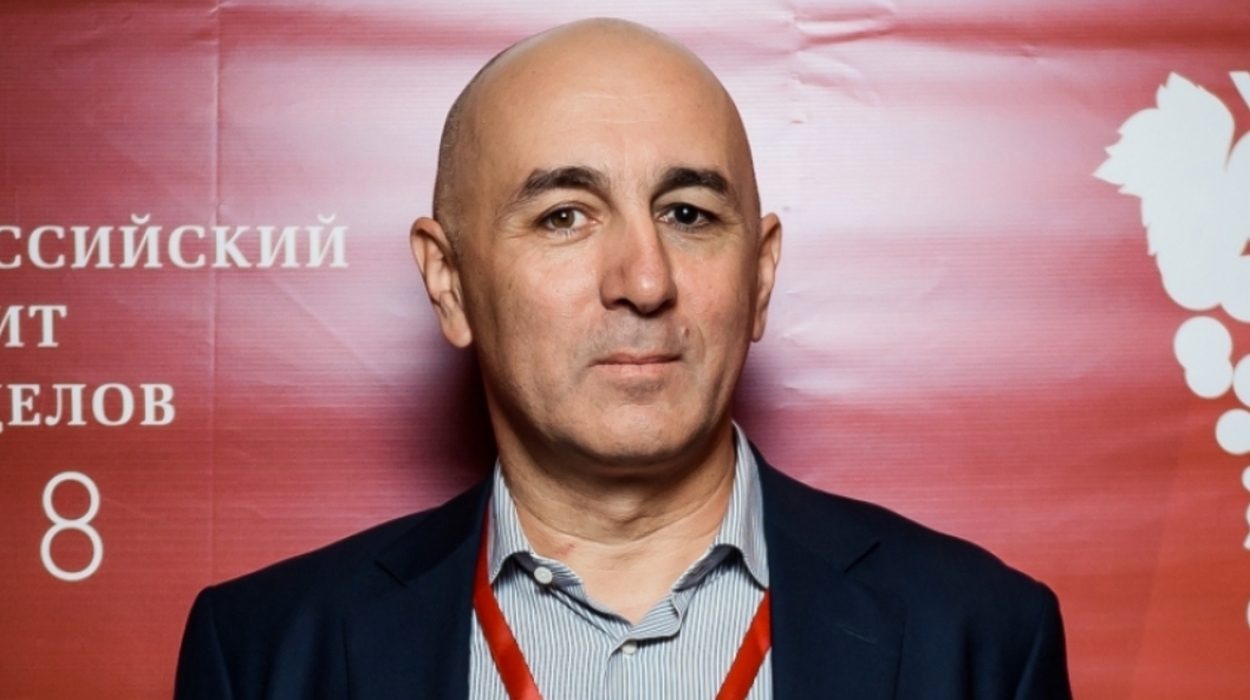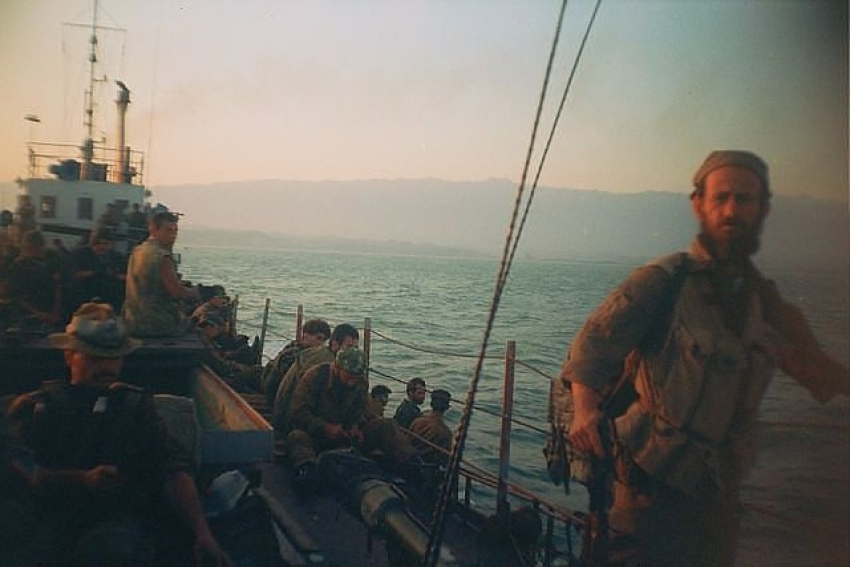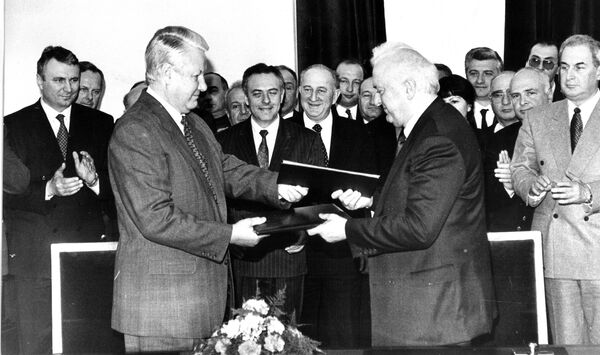Alkhas Argun: "Don't fight us; negotiate with us!"

Alkhas Argun, a veteran of the Patriotic War of the Abkhazian people of 1992-1993.
Alkhas Argun, a distinguished veteran of the Abkhazian Patriotic War of 1992-1993, shared insights with "Ekho Kavkaza [Echo of the Caucasus]" regarding the conflict's initial days. He recounted the formation of a volunteer squad from the North Caucasus and its journey into Abkhazia, as well as the deployment of the Tamysh paratroopers.
Alkhas, can you please tell us about the beginning of the Patriotic War of the Abkhazian people in 1992-1993 for you?
Alkhas Argun: At the onset of the war, on August 14, I was in Moscow. I was a student, it was vacation, but survival was tough back then. My friends and I were involved in some small business. On the 14th, what we saw was what everyone else saw - tanks and a helicopter firing near the beach. The next day, the diaspora gathered in Moscow, everyone who was there. We decided that those who could earn money should stay behind, and everyone else should go to Abkhazia to defend their homeland. We tried to travel there the next day, but planes weren't flying because of an air traffic controllers' strike. It was just one of those coincidences. There were always some strikes back in those days, though now they are mostly forgotten. In the end, we had to travel by train. While we were on the train, Georgians landed in Gagra and cut off our route. So, we ended up in the North Caucasus. We first went to Cherkessk, but then we were told that some groups were gathering in Grozny, so we were transported there by buses.
+ Georgian-Abkhaz War | FBIS Reports (August - October 1992)
+ “This day was very sad - 14 August 1992, when the war began.”
+ Selected FBIS Reports on Chechnya, Abkhazia & the Chechen War
You can't imagine the tremendous support, sympathy, and not just sympathy but also direct assistance. The Circassians and Abazins held a rally; the leader of the republic, Khubiev (I believe he was the leader then), came and started talking about peace, calling to cease fire, and so on. Some guys came and simply pushed him off the stage, saying, "They are killing us there, and you're talking about negotiations! We have to go and defend Abkhazia. We are forming volunteers; tomorrow morning, anyone who wants to, gather, and we'll head to Grozny." Dudaev was in Grozny at that time. We went from Nalchik to Grozny, where these groups were gathering. No weapons were given to anyone; there were Dudaev's special forces, and about three hundred of us gathered, all eager to get to Abkhazia.
What happened in Grozny?
— All the volunteers converged in Grozny, mainly Abkhazians who were in Russia because the only way through was over the mountain pass. Everyone was directed there to be transported in an organised manner. We drove to Cherkessk by cars, then we were taken to the pass. We made a mistake and instead of Damkhurts [Karachay-Cherkessia -ed.], we ended up in Arkhyz [Karachay-Cherkessia -ed.]. From Arkhyz, there's a route to the Southern shelter, and from there directly into the Kodor Gorge. By that time, I was familiar with the maps. The leader of our entire group was Shamil Basayev, who was in charge of Dudaev's special forces – 22 people. They were highly organised and disciplined, and everyone else followed them. We later realised our mistake, and since the road was blocked by that time, we had to make a foot journey from Arkhyz to Damkhurts. We walked all night, about thirty kilometres, and in the early morning, we crossed from Damkhurts to Avadkhara [Abkhazia -ed].
What happened to that squad afterward?
— The squad dispersed into various units, and we later participated in the Tamysh landing.
Please, tell us about the Tamysh landing. What do you remember? What was the most important part of this operation?
— It was a brilliantly executed operation. A successful operation of this kind speaks of the cohesion and high level of the Abkhazian army. Everything went perfectly smooth, without any hitches. We started in the evening, as it was getting dark. There are photos on the internet: a barge is moving, escorted by boats. There was one barge with the landing troops and another barge with the "Grad" multiple rocket launcher system. The commander of the "Grad" was Temur Nadaraya. Approximately at dawn, we docked in Tamysh. An incredible level of secrecy was maintained. We all remember how a few days before the assault on the Gudauta market, the details of the upcoming operation were being discussed. But here everything was different; I personally learned about the exact landing spot only when we were already at sea. It was very well done, plus the Eastern front performed just fantastically!
How was that manifested?
— The Eastern Front was cut off from the sea (the route was controlled by Georgian troops), and they had to prepare for our landing. Perhaps they had to fight their way to the coast, and we had to meet them with resistance. But by the time we landed, the entire territory and route to the sea were already liberated. In other words, when we arrived, everything was already done. Later, when the Georgians regrouped and started attacking from the Kindgi direction, heavy combat ensued. We were the first to arrive at the Tamysh school, and our first casualties occurred there that day. But overall, the operation was conducted excellently. Yes, there were some inconsistencies, but when an operation involves several hundred or even thousands of people and dozens of different groups, coordinating their interactions was very challenging. For instance, we weren't informed that our guys would be wearing red armbands. We almost shot at each other but luckily didn't! We recognised each other, communicated, and everything went smoothly.

On July 2, 1993, the Abkhazian marine forces launched an amphibious assault near Tamysh.
What was your objective?
— The objective was clear: the main Gudauta Front began its assault on Shroma to take the heights surrounding Sukhum. By this time, our command had realised that a head-on assault, as was attempted on January 5 and March 16, was not feasible. It threatened significant losses and yielded no results. Therefore, a diversionary attack was made on the lower bridge, while the main forces were directed towards Kaman, Shroma, and Tsugurovka, where heavy fighting ensued. Our task, in conjunction with the Eastern Front, was to cut off the Sukhum group from their supplies coming from Georgia.
Were you successful?
— I believe so. We held the route for nine days. On the first day, they attacked from the Sukhum side. They later realised they needed resources to resist our main offensive, and they started amassing forces from Georgia. We landed on the night of July 2, and they launched a major offensive on the 9th. In retrospect, there are things we would have done differently, like positioning our equipment in other ways. At that time, our forces began storming Anurkhua, a sacral place for them. Simultaneously, the Georgians were gathering a strong force to break through the landing from the Georgian side. This was a mistake, which we recognise now, but it wasn't evident then. In any case, during the eight days we held the route, the Gudauta troops managed to take all the heights, which pressured the Georgians into negotiations and a ceasefire. If you recall, in the agreement to withdraw troops, they agreed to everything, realising they couldn't hold onto Sukhum. That was the turning point.
Alkhas, looking at the Georgian-Abkhazian war of 1992-1993, what would you say about the role of Russia in this war?
— Here's what I want to say: an operation like a marine landing is a very complex military undertaking, requiring coordination between various types of troops, different units, and different fronts. This speaks to the high level of the Abkhazian army. And now, when we hear talks that our victory at the time was facilitated by Russia, it concerns me. There's also a very significant political undertone here. The Georgians very much want to portray this conflict not as an Georgian-Abkhazian one, to acknowledge that they were defeated by the Abkhazian army at that time, which is morally unsettling for them. On the other hand, it's beneficial for them to say that this was a Russia-Georgia conflict, especially given the current global opposition to Russia and the West. They argue, "See what they did with Crimea? They did the same with us back then." At the same time, it's also advantageous for Russia to group us with the DPR, LPR, and Crimea. However, our situation has nothing in common with theirs because our war was preceded by almost a century of national liberation struggle. Nothing like this happened in Crimea, DPR, or LPR. For instance, a resident of Donetsk or Luhansk isn't any different from someone from Kharkiv or Sumy – you wouldn't even notice a difference. Yet, our struggle spans the entire 20th century. So, this is fundamentally the wrong approach. Perhaps we haven't explained this clearly enough to the younger generation. For example, one of our young diplomats says that Russia helped us back then. By saying that, he's reinforcing what the Georgian side claims. But that's not the case. Those who witnessed it, including the Georgians, know that it was the Abkhazian army and Abkhazian leadership. Different factions existed in Russia back then – some supported Georgia, others supported us.
+ Tengiz Kitovani: "they [Russians] officially gave us the 108 tanks of the Akhaltsikhe Division"
+ Russian Officer Views Abkhaz Conflict (27 April 1993) | FBIS Report
+ Stanislav Lakoba: "If Yeltsin had been opposed, the war in Abkhazia would not have started"
+ Thirty Years' War. How the Georgian-Abkhazian war changed history, and history changed the war
It's often mentioned that the Abkhazian army had many Russian soldiers within its ranks. Was that really the case? They say the war was won thanks to Russia, suggesting that Abkhazians could never have won on their own. How would you respond to this?
— Indeed, the volunteer movement was very active. We had a considerable number of volunteers, but they were not the overwhelming majority. If we look directly at the list of those who perished, 80% were Abkhazians. Only 20% were volunteers, and among them, there were mostly Kabardians, meaning all Circassians, Abazins, Cossacks, Chechens, and we had one Ingush. By the way, there were also Ukrainians. It was a liberation struggle of the Abkhazian people. The Soviet Union had collapsed, and had Georgian society and leadership been wise then, saying, "Friends, we have a unique opportunity to build a civilised peaceful state. Let's try to do this together!", we would have attempted to find common ground. But you remember what happened then? "Georgia for Georgians, no Abkhazia, revert to the Constitution of 1918". We didn't initiate this war; our tanks didn't invade Georgia; it was the opposite.
About Russia's role, we all know that just days before August 14, Shevardnadze met with Yeltsin. This meeting was not coincidental. We don't have confirmed facts or recorded speeches, but maybe someday it'll be revealed. Most likely, they discussed the issue. Shevardnadze probably said, "Boris Nikolayevich, I need to settle this matter with the Abkhazians, and we can surely resolve it in three days!" To which Yeltsin might've replied, "Eduard Amvrosiyevich, just do it quickly!" Likely that's how it was, but it didn’t go as planned.
Alkhas, during the war, you and the soldiers fighting probably had a vision of post-war Abkhazia. You must have dreamt of the country after the war. Can you compare those dreams with the reality today, and how you see Abkhazia now?
— How should I put this? There's certainly significant disappointment because we expected a different Abkhazia. After our victory, after the war, all the energy and potential of our people, which could've been directed towards building, was stifled by the tentacles of the blockade. Our best aspirations were drowned in this blockade. It was in 1994 when Russia blocked all our contacts, restricting our development. Men from 18 to 55 years old couldn't cross the border, while women worked at the border. Everything stagnated. To bring a few wagons of grain to Abkhazia, the president had to negotiate with all services. We know how Russian bureaucracy can be, especially when it's uncooperative. This stagnant situation, this need, indeed crushed our people's faith in their future. I hope it hasn't been completely extinguished. When we talk about Russian aid now and our obligations to Russia today, we must remember that we owe Russia for stifling our best aspirations in the blockade of the 1990s. Russia helps us not because they love Abkhazians so much.

Russian President Boris Yeltsin and Georgian President Eduard Shevardnadze after signing the Treaty of Russian-Georgian Friendship, Good Neighborliness, and Cooperation (February 3, 1994).
The political and geopolitical situation has formed this way, but tomorrow it may change. However, we must pursue our goal, and our aim is to establish a stable, self-sufficient state. We cannot isolate ourselves from the entire world and stew in our own pot. We have an immense resource - our diaspora, the Circassian world, which comprises four million people. This number is comparable, in terms of population, to Georgia itself. We need to conduct our politics correctly, as before 1992, during the four to five years I refer to our contacts with the Circassians, with the North Caucasus, with the Turkish Abkhazians. They all were preparing an international movement to support Abkhazia. If this stage hadn't existed, the result of the war wouldn't have been the same. Now, unfortunately, there's a risk of another war for us. We cannot just sit idle; we need to prepare our nation and the entire Circassian world, of which we are a part, and make Georgia understand that we aren't just 200,000, but four million, just like them. Therefore, they shouldn't wage war against us; they should negotiate with us!